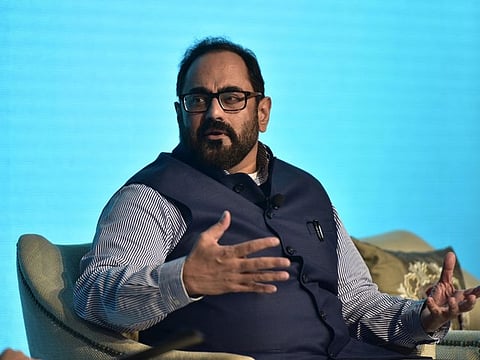India’s next big focus is reskilling its population to adapt to a post-pandemic world, says Chandrasekhar
MInister highlights India’s plan to become a $1 trillion digital economy

Dubai: Reskilling and upskilling India’s youth to help them adapt to a post-pandemic economy would be a real challenge, according to Rajeev Chandrasekhar, Minister of State for Skill Development, Entrepreneurship and Electronics, and Information Technology, Government of India.
In the last two years, companies in India and around the globe have accelerated their adoption of emerging technologies and this has rapidly changed job requirements, while introducing brand new roles that didn’t exist a few years prior.
India’s plan to achieve a $1 trillion digital economy is a statement to not just Indian entrepreneurs, but also to global players relying on the country’s technology products and services, said Chandrasekhar.
“We are at $350 billion today in the digital economy, but we plan to triple that very quickly and we understand how to get there,” said the minister, who was speaking at the India Global Forum. The plan “is signaling to the world that we have reset our ambitions and we are reimagining where we think we want to be”, he added.
Broad plan
Chandrasekhar noted that certain business sectors were hit particularly hard during the pandemic and it was necessary to equip employees in those areas with the relevant skills.
“In our skilling mission, we focus not just on skilling, we focus on skilling, upskilling and reskilling,” said the minister.
For a country like India, which has 3.5 million immigrant workers in other countries, it is “extremely important to protect their livelihoods”, he added.
Education is key
In 2020, India launched the National Education Policy (NEP), a comprehensive framework to guide the development of education in the country.
“Many things were taken for granted that have now become very important parts of governance discourse, and I think one of them is education,” said Chandrasekhar.
The minister added that under India’s new education policy, children will be introduced to a plethora of new opportunities. “Now, at the schooling level, we will give them vocational training and skills as a way of getting a job later on.”
“If a youngster today wants to be a computer programmer or musician, he or she should be able to do that through schooling,” said Chandrasekhar.
A ‘broken’ economy
“In 2014, when PM Modi was voted into power, we inherited an economy that was broken and the economic activity was concentrated around a few families and a few groups,” said the official. “Now, we have an amazing phenomenon of two unicorns a month and that is in the middle of the pandemic.”
“We are deeply pleased with where we are and it took a lot of hard work and a complete re-architecting of the economic landscape,” said Chandrasekhar. “With every good thing, there’s a lag effect and the very sharply defined strategy for the economy played itself out excellently during COVID.”
Sign up for the Daily Briefing
Get the latest news and updates straight to your inbox



